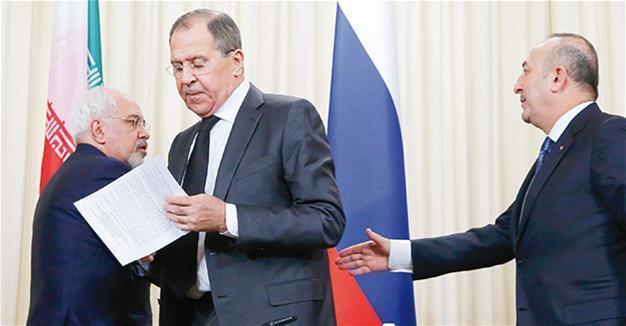Turkey-Russia and Iran to talks future of Syria in Astana
Sevil Erkuş - ANKARA

REUTERS photo
Turkey, Russia and Iran are set to meet in Astana in the middle of next month to seek a cessation of hostilities in Syria as part of a meeting that is being dubbed as a “confidence-building step complementary to the Geneva process,” a Foreign Ministry official told the Hürriyet Daily News on Dec. 23.
Russian President Vladimir Putin said Dec. 23 that the leaders of Turkey and Iran had agreed that the Syria peace talks should be held in Kazakhstan’s capital, Astana. He added that Syrian President Bashar al-Assad had agreed to the matter.
Putin said other regional players, including Saudi Arabia, could help contribute to peace efforts and that the United States was welcome to join.
Russian Deputy Foreign Minister Gennady Gatilov said Dec. 23 that he expected new Syria peace talks backed by Moscow, Ankara and Tehran to take place in the middle of January, the Interfax news agency reported.
It cited Gatilov as saying that he expected they would focus on discussing what needs to be done to effect a nationwide cease-fire for Syria in place. United Nations Syria mediator Staffan de Mistura has said he intends to convene separate peace talks in Geneva on Feb. 8, 2017.
A joint initiative by the three regional powers for talks in Astana could be a venue for “unofficial dialogue between representatives of the Syrian regime and opposition groups in addition to official dialogue in Geneva,” said the Turkish official.
“Discussions between representatives of Syrian regime and opposition on the future of Syria; political solution and transition process, will be beneficial,” said the official.
However, the dialogue could be productive for a political solution and transition process in Syria only if a truce is achieved across Syria, according to the Foreign Ministry official.
Lending support to peace talks, Ankara attaches importance to which groups will represent the Syrian opposition in the dialogue.
Support to Shiite groups should end
Meanwhile, Ankara urged Tehran to withdraw Shiite militants in Syria as part of efforts to usher in a truce in the war-torn country.
On Dec. 20, Turkey, Russia, and Iran adopted a declaration in Moscow to promote an immediate settlement to the Syria’s crisis. The tripartite talks came after civilians and opposition fighters were evacuated from Aleppo in a cease-fire brokered by Russia and Turkey – as well as Iran for two Shiite villages near Idlib – as guarantors of the agreement there.
However, a press conference for the Moscow declaration revealed differences between Turkey and Iran, as Foreign Minister Mevlüt Çavuşoğlu said they would continue to fight against terrorist organizations such as al-Nusra and the Islamic State of Iraq and the Levant (ISIL), yet stressing there were “foreign groups such as Hezbollah and other groups” present in Syria.
“Therefore, support for all these groups should be ended. It’s not appropriate to address a single side,” he said.
Speaking to the OIC Extraordinary Executive Committee Meeting On Dec. 22, the minister reiterated Turkey’s expectation for a truce in Syria.
“The regime must return to the negotiating table for direct talks with the opposition for a genuine political transition. We should send out a strong message that the foreign militia should leave Syria right away,” Çavuşoğlu said.
Official: No direct talks with Syrian regime
Some observers have interpreted Turkey’s recent actions, including participating in the Moscow declaration which reiterated “full respect for the sovereignty, independence, unity and territorial integrity of the Syrian Arab Republic” and emphasized the struggle against ISIL and al-Nusra, as a sign of Turkey’s moderation on its rhetoric on al-Assad.
Ankara had been insisting on the overthrow of al-Assad since the Syrian crisis erupted in 2011.
Turkey recently eased its position for talks between the Syrian opposition and the regime, but Ankara still rejects any direct deal with al-Assad’s regime.
“It’s not possible for us to have direct talks with the [Syrian] regime. Our attitude regarding this issue has not changed,” a senior Foreign Ministry official told the Daily News.
Following a political transition in the country, the Turkish state could have talks with the “new administration in Syria and discuss building the future of the country, and how Turkey can support the security of its neighboring country,” the official said.
